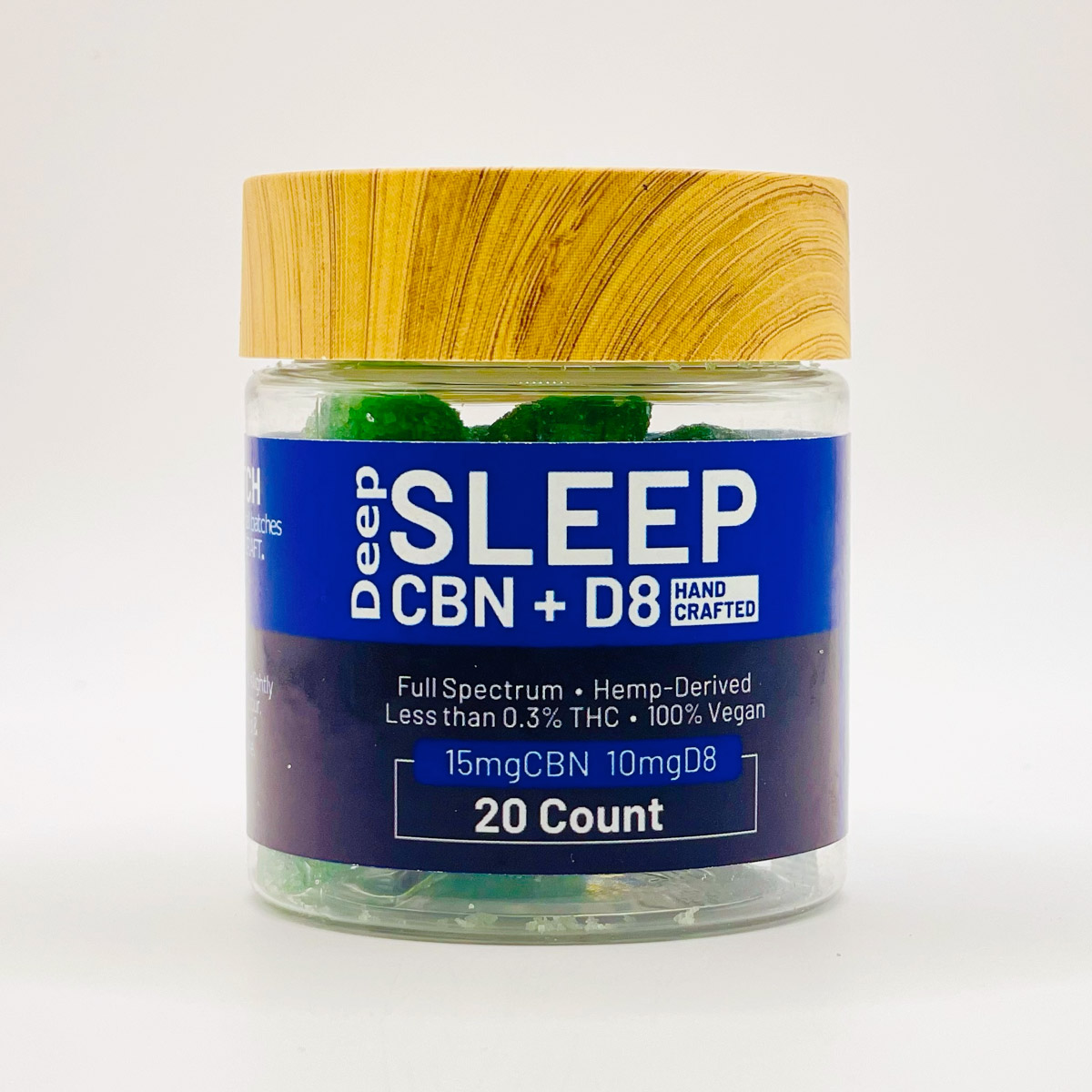Definition of Cannabinol (CBN):
Cannabinol (CBN) is a naturally occurring cannabinoid found in cannabis plants. While it may not be as well-known as its counterparts THC and CBD, CBN possesses unique properties that make it a fascinating subject of study. CBN is derived from aged or degraded THC, as the THC in cannabis plants breaks down over time or through exposure to heat or light, converting into CBN. This transformation process results in the creation of CBN, showcasing its potential as an essential compound with distinct effects.

Brief Explanation of CBN’s Origin and Extraction:
CBN originates from the degradation of tetrahydrocannabinol (THC), one of the primary cannabinoids found in the cannabis plant. When THC is exposed to oxygen, heat, or light, it gradually transforms into CBN. As a result, aged cannabis or cannabis that has been improperly stored can have higher concentrations of CBN. Extracting CBN involves isolating it from the rest of the cannabis plant through various extraction methods, which allows for the creation of CBN-rich products that can be used for therapeutic purposes.
The Connection Between Cannabinoids and the Endocannabinoid System (ECS):
To understand how CBN affects the body, it’s essential to grasp the role of cannabinoids and their interaction with the Endocannabinoid System (ECS). The ECS is a complex network of receptors found throughout the body, responsible for regulating various physiological processes, including mood, pain sensation, appetite, and sleep. Cannabinoids, such as CBN, interact with the ECS receptors, influencing its functioning and contributing to the body’s overall balance or homeostasis. By exploring CBN’s interaction with the ECS, we gain insights into its potential effects on sleep and how it may offer sleep-related benefits.

Exploring CBN’s Potential Benefits for Sleep:
The primary objective of this blog post is to unravel the intriguing potential of CBN as a sleep aid. As sleep is a fundamental aspect of our well-being, understanding how CBN interacts with the ECS and affects sleep-wake cycles is of great interest. We aim to present a comprehensive exploration of CBN’s properties, including its origins and extraction, and how it may impact sleep patterns. Through scientific evidence, studies, and real-life experiences, we strive to shed light on the potential benefits of CBN for sleep improvement, making it an informative guide for individuals seeking a natural and effective solution to their sleep-related challenges.
Understanding Sleep and Its Importance: Explanation of the Sleep-Wake Cycle
The sleep-wake cycle is a fundamental biological process that regulates our daily patterns of wakefulness and sleep. It is governed by the body’s internal clock, known as the circadian rhythm, which is influenced by external cues such as light and darkness. The cycle typically consists of alternating periods of wakefulness and sleep, with each cycle lasting approximately 24 hours. Understanding the intricacies of the sleep-wake cycle helps us comprehend the optimal timing for sleep and wakefulness, ensuring that we align our daily routines with our natural circadian rhythm.
Different Stages of Sleep and Their Significance:
Sleep is not a uniform state but comprises distinct stages, each serving a crucial purpose in promoting overall health and cognitive function. The two main categories of sleep are Non-Rapid Eye Movement (NREM) and Rapid Eye Movement (REM) sleep. NREM sleep consists of three stages (N1, N2, and N3), starting from light sleep and progressing to deep sleep. REM sleep, on the other hand, is characterized by vivid dreaming and plays a vital role in memory consolidation and emotional processing. Understanding these sleep stages provides insight into the complexity of sleep and the essential roles each stage plays in maintaining well-being.

The Impact of Poor Sleep on Overall Health and Well-Being:
Sleep is not merely a period of rest; it is a critical process that supports various aspects of physical and mental health. Chronic sleep deprivation or poor sleep quality can have profound effects on overall well-being. It can lead to cognitive impairments, reduced concentration, mood disturbances, and increased stress levels. Additionally, inadequate sleep is linked to a higher risk of developing chronic health conditions, such as obesity, diabetes, cardiovascular diseases, and compromised immune function. Recognizing the significance of quality sleep motivates us to explore potential solutions like CBN to address sleep-related issues.
Prevalence of Sleep Disorders and Challenges in Managing Them:
Sleep disorders affect a substantial portion of the global population, posing significant challenges to individuals’ physical and mental health. Conditions such as insomnia, sleep apnea, restless leg syndrome, and narcolepsy disrupt sleep patterns and can lead to severe daytime fatigue and impaired daily functioning. Managing sleep disorders can be complex, as they often require a multifaceted approach that addresses both underlying causes and symptoms. With conventional treatments sometimes yielding limited results or undesirable side effects, exploring natural alternatives like CBN becomes increasingly important in the quest for effective and sustainable sleep solutions.
How CBN Affects Sleep:
Interaction with the Endocannabinoid System (ECS) and Sleep Regulation:
CBN’s influence on sleep stems from its interaction with the Endocannabinoid System (ECS), a complex network of receptors found throughout the body. Within the ECS, CBN binds to CB1 and CB2 receptors, which are abundant in areas of the brain associated with sleep regulation. By engaging these receptors, CBN may modulate neurotransmitter release, particularly gamma-aminobutyric acid (GABA), which plays a crucial role in promoting relaxation and reducing neural activity. This interaction appears to have a calming effect on the nervous system, potentially paving the way for improved sleep quality and duration.
CBN vs. Other Cannabinoids (THC, CBD) and Their Specific Sleep-Related Effects:
While CBD and THC are better-known cannabinoids, CBN stands out due to its potential sleep-related effects. Unlike THC, which is known for its psychoactive properties and may disrupt sleep patterns in some individuals, CBN is non-intoxicating and is not associated with feelings of euphoria. On the other hand, CBD’s effects on sleep are diverse, with some users reporting alertness and wakefulness during the day. CBN, however, seems to lean more towards promoting sedation and relaxation, making it a compelling option for those seeking a natural sleep aid.
Mechanisms of Action that Promote Relaxation and Sedation:
CBN’s ability to promote relaxation and sedation may lie in its unique mechanisms of action. Firstly, it appears to have a high affinity for CB1 receptors in the brain, which are believed to play a role in anxiety and stress reduction. By targeting these receptors, CBN may help soothe an overactive mind, easing the transition into a peaceful slumber. Secondly, CBN is believed to enhance the effects of GABA, a neurotransmitter responsible for inhibiting brain activity. By increasing GABA’s influence, CBN may reduce neural excitability and induce a state of relaxation, ideal for initiating and maintaining a restful sleep experience. Additionally, CBN’s anti-inflammatory and pain-relieving properties may indirectly contribute to sleep improvement by alleviating discomfort and aiding in physical relaxation.

Overview of Studies on CBN’s Effectiveness in Addressing Insomnia:
Numerous studies have explored the potential of CBN as a remedy for insomnia, a prevalent sleep disorder characterized by difficulty falling asleep or staying asleep. Research suggests that CBN may be effective in promoting sleep onset by interacting with the ECS and influencing sleep-regulating receptors in the brain. Some studies have found that CBN exhibits mild sedative effects, making it a promising option for individuals struggling with sleep initiation. While the body of research on CBN’s sleep-related benefits is still evolving, initial findings indicate that this cannabinoid holds promise in alleviating insomnia-related challenges.
User Experiences and Testimonials Related to Improved Sleep Onset:
Beyond the scientific studies, many individuals have reported positive experiences with CBN for improving sleep onset. Users often describe feeling a sense of calm and tranquility shortly after taking CBN, leading to a more relaxed transition into sleep. These anecdotal accounts often highlight CBN’s gentle and non-intoxicating nature, allowing users to avoid the adverse effects associated with traditional sleep medications. Furthermore, CBN’s natural origin from the cannabis plant appeals to those seeking holistic and plant-based approaches to managing their sleep issues. While more extensive research is needed to fully validate these user experiences, their insights provide valuable firsthand perspectives on CBN’s potential as a sleep aid.
Sleep Maintenance and Sleep Duration: The Role of CBN in Prolonging Sleep Duration
One of the intriguing potential benefits of CBN is its impact on sleep duration. While individual responses to CBN may vary, some studies suggest that this cannabinoid could prolong total sleep time. CBN’s interactions with the ECS and its calming effects on the nervous system may contribute to a more extended period of uninterrupted sleep. By targeting receptors associated with sleep regulation and promoting relaxation, CBN could extend the duration of both NREM and REM sleep stages, optimizing the body’s restorative processes during the night.
Research on its Impact on Sleep Maintenance and Night-Time Awakenings:
Sleep maintenance refers to the ability to stay asleep throughout the night without frequent awakenings. CBN’s potential in improving sleep maintenance has caught the attention of researchers. Some studies suggest that CBN may reduce the frequency of nighttime awakenings, helping individuals stay in a deeper and more continuous sleep state. By modulating neurotransmitter activity and promoting a sense of tranquility, CBN may reduce sleep disruptions caused by stress, anxiety, or discomfort, leading to a more restful night’s sleep. These findings pave the way for further exploration of CBN’s efficacy in managing sleep maintenance issues, offering hope for individuals seeking a natural solution to nocturnal awakenings. As with all potential sleep aids, it is essential to consult with a healthcare professional before incorporating CBN or any new supplement into one’s sleep regimen to ensure safety and suitability for individual needs.
Pain Management and Sleep Quality: CBN’s Potential as a Pain-Relieving Agent and Its Effects on Sleep
CBN has shown promise as a potential pain-relieving agent, which may have direct implications for sleep quality. Pain and sleep are intricately connected, as chronic pain can disrupt sleep patterns and lead to sleep disturbances. Studies suggest that CBN may interact with receptors involved in pain perception, potentially reducing pain signals and promoting pain relief. By alleviating discomfort, CBN may create a more conducive environment for sleep, allowing individuals to experience improved sleep quality and uninterrupted rest.
Addressing Chronic Pain-Related Sleep Disturbances with CBN:
For those suffering from chronic pain-related sleep disturbances, CBN presents a potentially beneficial option. The analgesic properties of CBN could provide relief from pain, making it easier for individuals to fall asleep and stay asleep throughout the night. By targeting pain pathways and reducing inflammation, CBN might offer a holistic approach to addressing the underlying causes of sleep disturbances induced by chronic pain conditions. Moreover, since CBN is non-psychoactive, users can avoid the mind-altering effects often associated with THC-based treatments, making it a favorable choice for individuals seeking natural and non-intoxicating pain management solutions. As with any supplement or treatment, it’s crucial for those with chronic pain conditions to consult with their healthcare provider to ensure CBN is a safe and suitable option for their specific needs.
Anxiety and Stress Reduction for Better Sleep: CBN’s Anxiolytic Properties and Their Connection to Improved Sleep
CBN’s potential as an anxiolytic compound has garnered interest in the context of sleep improvement. Anxiety and stress often play a significant role in sleep disturbances, making it challenging for individuals to relax and fall asleep peacefully. CBN interacts with the ECS and may influence receptors associated with anxiety and stress regulation. By modulating these receptors, CBN may help reduce feelings of anxiety and promote a sense of calmness and relaxation. As anxiety levels subside, individuals may find it easier to transition into a restful state, leading to improved sleep quality and a more rejuvenating slumber.
Managing Stress-Related Insomnia Using CBN:
Stress-related insomnia is a prevalent sleep disorder wherein individuals struggle to sleep due to heightened stress and worry. CBN’s anxiolytic effects make it a potential natural remedy for managing this type of insomnia. As CBN interacts with the ECS and influences neurotransmitter activity, it may attenuate the body’s stress response and counteract the disruptive effects of stress on sleep. By promoting relaxation and reducing anxious thoughts, CBN provides a calming influence that could aid in falling asleep faster and experiencing fewer awakenings during the night. Moreover, CBN’s non-addictive nature makes it an attractive alternative to conventional sleep medications that may carry the risk of dependency or adverse side effects. However, as with any sleep aid or supplement, individuals with chronic stress or anxiety should seek guidance from a healthcare professional to determine the most suitable approach to managing their condition and promoting better sleep.
CBN and REM Sleep Enhancement: Exploring How CBN May Affect REM Sleep
REM (Rapid Eye Movement) sleep is a crucial stage of the sleep cycle associated with vivid dreams and heightened brain activity. While research on CBN’s direct impact on REM sleep is still limited, some studies suggest that CBN may have the potential to influence this sleep stage. The Endocannabinoid System’s modulation by CBN could indirectly impact the regulation of REM sleep through its interactions with various receptors in the brain. As REM sleep plays a vital role in memory consolidation, emotional processing, and overall cognitive function, understanding CBN’s potential effects on this stage could shed light on its comprehensive impact on sleep quality.
The Significance of REM Sleep for Overall Sleep Quality:
REM sleep is a critical component of a well-rounded sleep cycle, contributing to the overall quality of sleep. During this stage, the brain becomes highly active, engaging in processes that aid in memory consolidation and learning. Additionally, REM sleep is associated with emotional regulation, helping individuals process and cope with daily experiences. Adequate REM sleep is vital for mental and emotional well-being, and disruptions to this stage can lead to feelings of grogginess, difficulty concentrating, and emotional imbalance. As CBN’s potential to impact REM sleep is further explored, researchers and sleep experts may gain deeper insights into how this cannabinoid may contribute to enhancing overall sleep quality and optimizing the restorative benefits of a good night’s sleep. However, it is essential to approach CBN as a potential REM sleep enhancer with a cautious perspective, as more extensive research is needed to fully understand its effects on REM sleep and its implications for sleep health.
Scientific Studies and Evidence: Overview of Relevant Studies and Clinical Trials
In recent years, the scientific community has shown increasing interest in exploring the potential sleep-related benefits of CBN. While research on CBN is still in its early stages, several studies and clinical trials have investigated its effects on sleep quality, duration, and insomnia relief. Some studies have examined the interactions between CBN and the Endocannabinoid System, shedding light on its mechanisms of action in sleep regulation. Clinical trials have also explored CBN’s safety profile and its impact on sleep-related parameters, gathering valuable data on its efficacy as a potential sleep aid. These studies provide a foundation for understanding CBN’s potential role in improving sleep and offer insights into its applications for addressing sleep-related challenges.
Analysis of the Findings and Limitations of Existing Research:
While the available studies on CBN’s sleep-related benefits are promising, it’s essential to approach the findings with a critical lens. Many of the existing studies are relatively small-scale and may have limitations in terms of sample size, study duration, and control groups. Additionally, as CBN research is still emerging, some studies may lack standardized protocols, leading to variations in dosages and formulations used. Moreover, the heterogeneity of individual responses to CBN highlights the need for more extensive research to better understand its effects on diverse populations and sleep disorders. Despite these limitations, the existing evidence suggests that CBN holds potential as a natural sleep aid, warranting further investigation to solidify its role in sleep improvement.
Expert Opinions and Insights on CBN’s Sleep-Related Benefits:
Experts in the fields of sleep medicine and cannabis research have shared valuable insights into CBN’s potential benefits for sleep. Some sleep specialists believe that CBN’s interaction with the ECS and its sedative properties make it a promising candidate for addressing insomnia and promoting relaxation. Furthermore, cannabinoid researchers recognize the need for more robust clinical trials to ascertain CBN’s efficacy and safety as a sleep aid. As CBN gains traction in the wellness community, experts caution that individual responses may vary, and it should not replace comprehensive sleep hygiene practices. Together, expert opinions and ongoing research efforts offer a balanced view of CBN’s potential as a sleep-enhancing compound, guiding individuals and healthcare professionals alike in making informed decisions regarding its use for sleep improvement.
Safe Usage and Considerations:Appropriate Dosages for Sleep-Related Issues
Determining the appropriate dosage of CBN for sleep-related issues is essential to ensure its safe and effective use. However, it’s important to note that research on CBN’s optimal dosage for sleep is still limited. Individual responses to cannabinoids can vary, and what works for one person may not be suitable for another. As a general guideline, starting with a low dosage and gradually increasing it, if necessary, is a prudent approach. Consulting with a healthcare professional or a knowledgeable cannabis specialist can provide personalized recommendations based on factors such as an individual’s weight, medical history, and existing sleep challenges. This way, users can find the ideal dosage that offers the desired sleep benefits while minimizing the risk of adverse effects.
Potential Side Effects and Interactions with Medications:
While CBN is generally considered safe, like any supplement, it may have potential side effects. Some individuals may experience mild side effects, such as dry mouth, dizziness, or gastrointestinal discomfort. Additionally, CBN can interact with certain medications, particularly those metabolized by the liver’s cytochrome P450 enzymes. This could impact the efficacy or safety of medications, leading to unintended consequences. To mitigate these risks, individuals taking prescription medications should consult their healthcare provider before incorporating CBN into their sleep regimen. Healthcare professionals can evaluate potential drug interactions and adjust dosages as needed, ensuring a safe and appropriate integration of CBN into the individual’s existing treatment plan.
Special Considerations for Specific Populations (e.g., Pregnant Individuals, Elderly):
Certain populations may require special considerations when using CBN as a sleep aid. For example, pregnant individuals should exercise caution, as limited research is available on the effects of CBN on fetal development. The potential risks and benefits should be carefully evaluated before use during pregnancy. Similarly, elderly individuals may have different sensitivities to cannabinoids and may need lower dosages to achieve the desired effects. Furthermore, individuals with underlying medical conditions or compromised immune systems should also seek guidance from a healthcare professional before using CBN, as its impact on specific health conditions is still being studied. By taking these special considerations into account, individuals can make informed decisions about the safe and appropriate use of CBN for sleep enhancement.
Combining CBN with Other Sleep-Enhancing Practices: Importance of a Comprehensive Sleep Hygiene Routine
While CBN shows promise as a potential sleep aid, it should not be viewed as a standalone solution. Incorporating CBN into a comprehensive sleep hygiene routine can optimize its effectiveness. Sleep hygiene practices involve creating a conducive sleep environment and adopting bedtime habits that promote restful sleep. These practices include maintaining a consistent sleep schedule, limiting exposure to screens before bedtime, and creating a comfortable and quiet sleep environment. By incorporating CBN as one component of a well-rounded sleep hygiene routine, individuals can establish healthy sleep patterns and enhance the overall quality of their sleep.

Tips for Optimizing Sleep Environment and Bedtime Habits:
Creating an ideal sleep environment and adopting healthy bedtime habits can significantly impact sleep quality. Ensuring the bedroom is cool, dark, and quiet can promote better sleep. Limiting caffeine and heavy meals close to bedtime, as well as establishing a relaxing pre-sleep routine, can signal to the body that it’s time to wind down. Additionally, maintaining a consistent sleep-wake schedule helps regulate the body’s internal clock and promotes better sleep patterns. Combining these practices with CBN can create a synergistic effect, optimizing the chances of experiencing restful and rejuvenating sleep.
The Synergy of CBN with Relaxation Techniques (e.g., Meditation, Yoga):
Relaxation techniques such as meditation, yoga, and deep breathing exercises can complement the effects of CBN, enhancing its potential benefits for sleep. These practices are known to reduce stress and promote a sense of calm, which can be particularly beneficial for individuals struggling with stress-related insomnia. By incorporating relaxation techniques alongside CBN use, individuals can create a harmonious bedtime routine that encourages both physical and mental relaxation. Engaging in these practices before taking CBN may prepare the mind and body for a more tranquil sleep experience, allowing individuals to maximize the positive effects of CBN on sleep quality. The combination of CBN with relaxation techniques offers a holistic approach to achieving restful sleep and may provide a natural and comprehensive solution for those seeking sleep improvement.
Legal Status and Availability of CBN Products:Current Legal Status of CBN in Different Regions
The legal status of CBN can vary significantly depending on the region and the country’s cannabis regulations. In some places, CBN derived from hemp may be considered legal, provided it contains less than the legally defined threshold of THC. However, in regions where cannabis is strictly regulated, CBN products may fall under specific restrictions, making them accessible only through licensed dispensaries or for medical use. It is crucial for individuals to be aware of their local laws and regulations regarding cannabis and cannabinoid products, including CBN, to ensure compliance with the law and avoid any potential legal issues.
Where to Find CBN Products and How to Choose Reputable Brands:
CBN products are becoming more widely available as interest in this cannabinoid grows. They can be found in specialty cannabis dispensaries, online retailers, and wellness stores. When seeking CBN products, it is essential to prioritize reputable brands that adhere to stringent quality and safety standards. Look for brands that provide third-party lab test results, ensuring the purity and potency of their products. Customer reviews and testimonials can also offer valuable insights into the reliability and effectiveness of specific CBN products. Additionally, seeking guidance from healthcare professionals or cannabis specialists can help individuals make informed choices and find CBN products that align with their specific sleep needs and preferences.
Types of CBN Products and Their Pros and Cons:
CBN products come in various forms, each with its own set of advantages and considerations. Common types of CBN products include oils, tinctures, capsules, edibles, and topicals. CBN oils and tinctures offer fast absorption and customizable dosages, making them popular choices for sleep aid. Capsules provide a convenient and discreet way to consume CBN, while edibles offer a tasty option for those who prefer a more enjoyable consumption experience. Topicals infused with CBN are primarily used for localized pain relief. However, it’s important to note that the effects and onset time may vary between different product types. For instance, edibles typically take longer to take effect, while tinctures have a faster onset. Individuals should consider their specific needs, desired effects, and personal preferences when selecting a CBN product that suits them best.
Real-Life Experiences and Testimonials: Gathering Anecdotes and Experiences from CBN Users
Real-life experiences and testimonials from individuals who have used CBN for sleep can offer valuable insights into its efficacy and potential benefits. These anecdotes can provide a window into how CBN affects different people, including its varying effects on sleep quality, sleep duration, and overall well-being. Examining firsthand accounts of CBN users allows us to understand the diverse range of responses and the individual factors that may influence the outcomes. These personal narratives contribute to the collective knowledge surrounding CBN’s impact on sleep health, helping others make informed decisions when considering CBN as a sleep aid.
Success Stories and Challenges Faced by Individuals Using CBN for Sleep:
Real-life accounts of success stories and challenges faced by individuals using CBN for sleep provide a comprehensive view of its potential as a sleep-enhancing remedy. Some users may share positive experiences, describing how CBN has improved their sleep patterns, reduced insomnia, or alleviated pain-related sleep disturbances. On the other hand, some individuals may recount challenges, such as dosage adjustments or the need to combine CBN with other sleep-enhancing practices to achieve the desired results. Exploring these varying experiences helps to recognize both the benefits and limitations of CBN as a sleep aid, ensuring a balanced understanding of its effectiveness.
Building a Balanced Understanding of CBN’s Effectiveness Based on Real-Life Accounts:
Real-life experiences and testimonials offer meaningful anecdotal evidence that complements scientific studies and clinical trials on CBN. While anecdotal evidence cannot replace rigorous scientific research, it provides valuable qualitative data that can inform the ongoing exploration of CBN’s efficacy as a sleep aid. By considering both scientific findings and real-life accounts, a more balanced understanding of CBN’s potential benefits for sleep can be developed. It also highlights the importance of individual variability in response to CBN, recognizing that what works for one person may not yield the same results for another. Building a comprehensive understanding of CBN’s effectiveness based on real-life accounts helps guide users and healthcare professionals in making informed decisions about its use for sleep improvement.
Want to try our CBN? Check out the latest from our product lineup:
Lets check out what we learned in conclusion: Recap of CBN’s Potential Benefits Related to Sleep
In conclusion, Cannabinol (CBN) shows great promise as a potential sleep aid with various benefits for sleep improvement. Through its interaction with the Endocannabinoid System (ECS), CBN may promote relaxation, alleviate anxiety, and reduce pain, all of which contribute to better sleep quality and duration. Studies suggest that CBN could aid in insomnia relief, sleep onset improvement, and potentially enhance REM sleep, making it a compelling option for those seeking natural sleep solutions.
Emphasizing the Importance of Individual Differences in Responses to CBN:
It is crucial to recognize that individual responses to CBN may vary significantly. While some individuals may experience positive effects on sleep with CBN, others may not achieve the same results. Factors such as metabolism, genetics, and existing health conditions can influence how CBN interacts with the body. As with any supplement or treatment, it is essential to approach CBN with an awareness of these individual differences and to remain open to adjusting dosages or exploring alternative approaches if needed.
Call for Further Research and Exploration of CBN’s Sleep-Related Effects:
Despite the promising initial findings, the research on CBN’s sleep-related effects is still in its infancy. To fully understand its mechanisms of action, optimal dosages, and potential long-term effects, further rigorous scientific research and clinical trials are needed . Robust studies would strengthen the evidence base and provide more comprehensive insights into CBN’s role as a sleep aid, allowing healthcare professionals and individuals alike to make more informed decisions about its use.
Encouraging Readers to Consult with Healthcare Professionals Before Trying CBN for Sleep Improvement:
Before incorporating CBN into their sleep routines, readers are strongly encouraged to seek guidance from healthcare professionals. Consulting with a healthcare provider ensures that CBN is safe and suitable for individual needs, especially for those with underlying health conditions or taking medications. Healthcare professionals can offer personalized recommendations, monitor progress, and address any concerns, ensuring a safe and informed approach to using CBN for sleep enhancement.
In conclusion, while CBN holds promise as a potential natural sleep aid, it is essential to approach its use with a comprehensive understanding of its effects and limitations. Combining CBN with other sleep-enhancing practices, maintaining a consistent sleep hygiene routine, and seeking professional guidance can create a synergistic approach to improve sleep quality and overall well-being. As research on CBN continues to evolve, its role in sleep health will likely become more defined, further empowering individuals in their pursuit of restful and rejuvenating sleep.





0 Comments